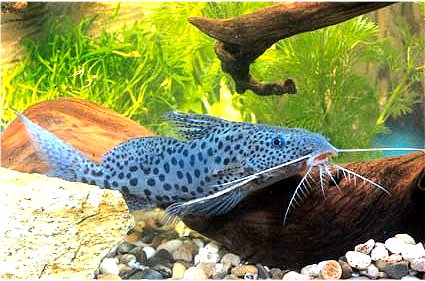Acanthomias
Posted: 24 Apr 2003, 17:06
Thanks for information!
Finnish catfishspecialist, who has had these fishes, says in his book, that Acanthomias will grow 30 cm long (max) in aquarium. It can be territorial, but it off course depends on individual. I must say again, that the present owner said, that there has´nt been any problems with this fish. He actually was quite suprised, when I asked, if there has been any problems. In nature Acanthomias grow naturally much bigger than in aquarium conditions. I have planned to put two couples of angelfishes into my tank, four Ancistrus temminkii´s (i dont know the english common names of these fishes), five peppered corydoras, four Colisa lalia´s, three Crossocheilus siamensis ( these fishes I allready have). And hopefully another Syno. I haven´t seen S. longirostris so I dont know what it looks like. S. decorus looks allso very different than Acanthomias, but it allso grows big (max.30cm). Maybe one/ two S. eupterus/ flavitaeniatus/greshoffi with Acanthomias? There are plenty of big bogwood hideout´s in the tank.
-Satu
Finnish catfishspecialist, who has had these fishes, says in his book, that Acanthomias will grow 30 cm long (max) in aquarium. It can be territorial, but it off course depends on individual. I must say again, that the present owner said, that there has´nt been any problems with this fish. He actually was quite suprised, when I asked, if there has been any problems. In nature Acanthomias grow naturally much bigger than in aquarium conditions. I have planned to put two couples of angelfishes into my tank, four Ancistrus temminkii´s (i dont know the english common names of these fishes), five peppered corydoras, four Colisa lalia´s, three Crossocheilus siamensis ( these fishes I allready have). And hopefully another Syno. I haven´t seen S. longirostris so I dont know what it looks like. S. decorus looks allso very different than Acanthomias, but it allso grows big (max.30cm). Maybe one/ two S. eupterus/ flavitaeniatus/greshoffi with Acanthomias? There are plenty of big bogwood hideout´s in the tank.
-Satu
